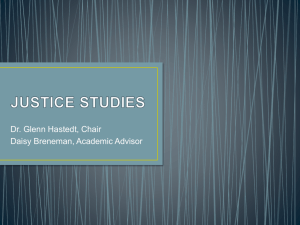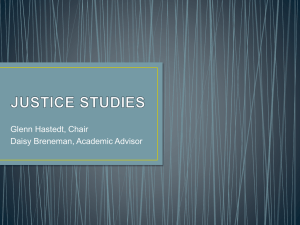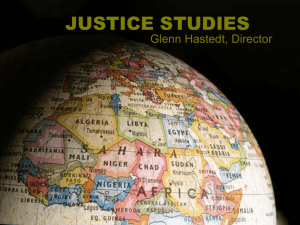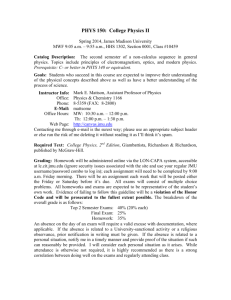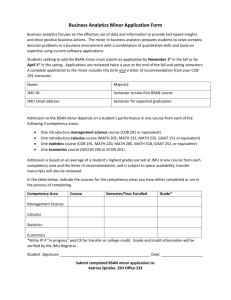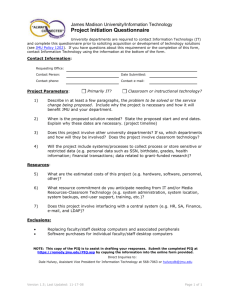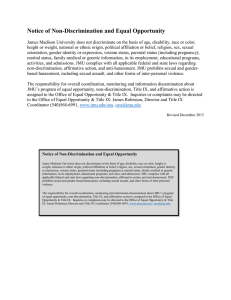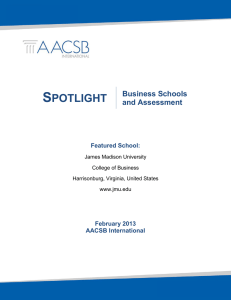CHOICES 2016 Presentation
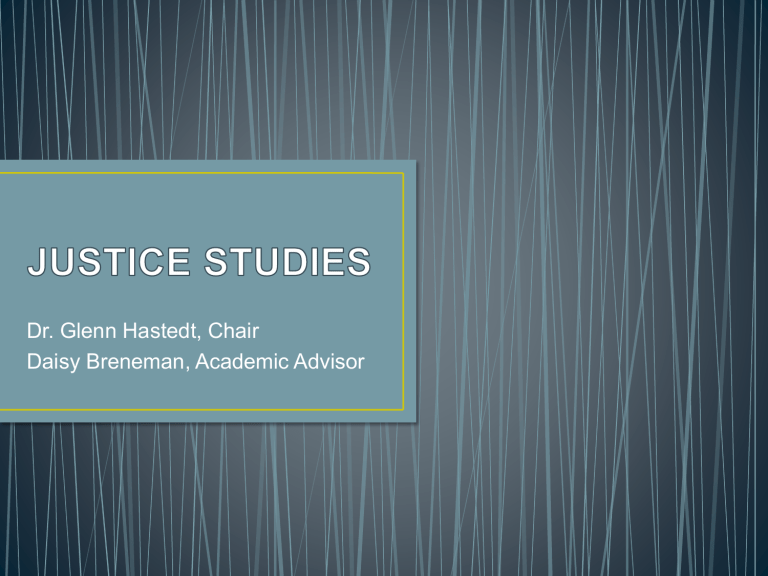
Dr. Glenn Hastedt, Chair
Daisy Breneman, Academic Advisor
JUSTICE is a concept that encompasses the principles of fairness, equity, and right action. Justice is necessary for sustaining and promoting the growth and development of individuals and communities politically, economically, and socially.
• Liberal Arts program
• Social sciences and the humanities
• Interdisciplinary
• Looking at “puzzles”: rigorous analysis
• Policy focused
• Students develop a personal definition of justice
• A Criminal Justice Major
• Criminal Justice Minor at JMU, pre-professional focus
• CRJU programs : applied problems to be solved
• JUST views justice issues as a general class of social and political problems to be understood; looks at puzzles that have multiple answers depending on perspective
• Pre Law School Major
• JMU offers Pre-law as a pre-professional program; students select major from a wide range of fields
• Core Requirements:
• Intro to Justice Studies
• Out-of-track foundation course
• Proseminar
• Comparative
• Research Methods
• Senior Seminar
• Track Requirements
• Track A: Crime and Criminology
• Track B: Global Justice and Policy
• Track C: Social Justice
• First semester: JUST 200
• Second Semester: Track Foundation Courses
• Third Semester and Beyond: Upper Level Track Courses
• Last Two Semesters: Research Methods and Senior
Seminar
• Fairness
• Standards
• Rights
• Responsibilities
• Focuses on nature, causes and solutions for crime, primarily focused on U.S. at the national level
• Explores questions of justice in the context of criminal behavior
• Theoretical traditions in the Social Sciences
• Emphasis on thoughtful examination of the responses to crime, with a concentration on effective policy initiatives
• Explores issues of justice in global context; questions of security, equity and equality
• Diverse topics, including international law, national security, war & peace, cross cultural relations, democratization, environmental protection, conflict resolution and human rights
• Designed to investigate what is fair, equitable and just
• Emphasizing the oppression and liberation of vulnerable, exploited and marginalized populations
• Promotes sustainable and just solutions to social, political and economic problems (such as poverty, discrimination, environmental destruction)
• Washington Semester
• JMU housing
• Fall for Track A or C; Spring for B or C
• Internships
• Detailed information on the Justice Studies website
• Most do them in the summer
• Optional, but encouraged
• Study Abroad
• See Office of International Programs
• Students are encouraged to participate in civic and community engagement opportunities
• Nelson Institute Seminar
• JMU opportunities and resources (examples):
• Mahatma Gandhi Center for Global Nonviolence
• Community Service-Learning Office
• Student Organizations
• Learn more on the Justice Studies website:
• www.jmu.edu/justicestudies
• Track A : local, state, federal law enforcement (police,
Homeland Security, Secret Service, FBI,); law; corrections; academic/research
• Track B : federal law enforcement, peace corps, international aid agencies, NGOs, diplomatic corps
• Track C : mediation organizations, human services, overseas development organizations, nonprofits
• *But these aren’t the only possibilities
• Liberal Arts degree program
• Not applied/preparing for a specific job
• Knowledge & critical thinking skills
• Learn (how) to learn
• Important in the rapidly-changing career world
• Think about academic and career goals, and what you want your college experience to be
• Explore, learn more, use resources
• Where and what feels right
• What am I going to give back?
• Engaged University
